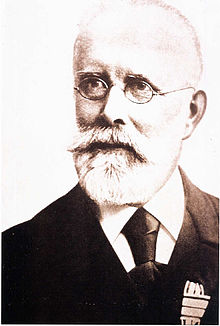Carl Hesselmann
Carl Hesselmann (born September 9, 1830 in Menden near Mülheim an der Ruhr , † March 25, 1902 in Witzhelden ) was an elementary school teacher and pomologist . He studied at the teachers' college in Xanten and from 1861 worked as a teacher at the elementary school in Witzhelden.
Life
At the school, Hesselmann created a tree farm with a tree nursery for teaching his students. Every pupil received a sapling as a gift upon leaving school, which encouraged the planting of fruit trees in the community. Hesselmann also contributed significantly to the spread of plums in the Bergisches Land . In his tree nursery he cultivated 220 varieties of plums and thus had one of the largest assortments of plums in Germany. In 1877 Hesselmann founded the ' Association for the Promotion of the Rose Culture of the Bergisches Land Solingen' in Solingen. He took over the first chairmanship of the association, which still exists today.
Carl Hesselmann "discovered" an apple variety in the manor garden of Haus Bürgel near Monheim in 1864 . In 1875 he sent 30 apples to Kaiser Wilhelm I with the request that the apple variety be named Kaiser Wilhelm after him . On December 16, 1875 he received a letter from the emperor in which he approved the naming. Recent studies have shown that the Kaiser Wilhelm apple is identical to the "Peter Broich" variety that was already known at the time.
Hesselmann published numerous articles in newspapers and specialist magazines as well as a "guide to fruit culture".
In 1880, Hesselmann bought a piece of land to plant an orchard on it. In honor of Crown Prince Wilhelm, who later became Emperor Wilhelm II, he named his fruit tree farm Wilhelmstal . A district of Witzhelden still bears the name "Wilhelmstal" today.
Honors
There has been a Hesselmannstrasse in Leichlingen since 1958 .
See also
Web links
- Apple variety Kaiser Wilhelm - information
- What does the witty hero Carl Hesselmann have to do with Prince Pückler and Kaiser Wilhelm I?
- Witzhelden apple scientist is very wrong
| personal data | |
|---|---|
| SURNAME | Hesselmann, Carl |
| BRIEF DESCRIPTION | German teacher and plant breeder |
| DATE OF BIRTH | September 9, 1830 |
| PLACE OF BIRTH | Menden near Mülheim an der Ruhr |
| DATE OF DEATH | March 25, 1902 |
| Place of death | Joke heroes |
